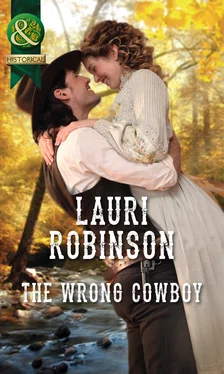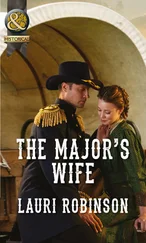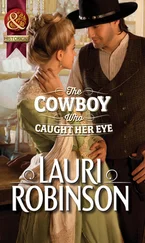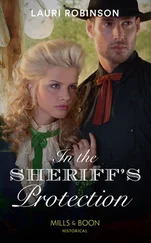Not that he was enticed. He knew enough not to be drawn in by the graceful arch of her chin or how her lashes looked an inch long as she stared straight ahead.
After another weighty sigh, she said, “Mr. Wagner and I have not officially met, yet.”
“Lucky man,” Stafford mumbled, trying to override the direction his thoughts wanted to go.
An owl couldn’t snap its neck as fast as she could, and he was saved from whatever she’d been going to say when one of the kids—he couldn’t tell them apart for other than a few inches in height they all looked alike—poked their head through the canvas opening and whispered something in her ear.
Stafford’s nerves ground together like millstones at the way her voice softened. When she spoke to those children honey practically poured out of her mouth. When it came to him, her tone was as sharp as needles. He couldn’t help but imagine it would be the same for Mick. The poor fool. What had he been thinking?
An hour later, Stafford had flipped that question around on himself. What had he been thinking? Though he wasn’t an overly religious man, he found himself staring skyward and pleading. Save me. For the love of God, save me.
Traveling with six kids was maddening. They flapped around more than chickens in a crate and argued nonstop, not to mention he’d had to halt the wagon again, twice, for people to relieve their “small bladders.” No wonder. She passed the canteen between those kids on a steady basis. Insisting they drink in this heat.
He’d had enough. That was all there was to it. Enough. Even before discovering the dog—which looked more like a rat—the kids had been hiding in the back of the wagon. It had been clear Marie hadn’t known the older boys had smuggled it aboard, not until it, too, had to relieve itself. A dog that size wasn’t good for anything except getting stepped on, and from the looks of its round belly and swollen teats, there’d soon be a few more of them running around. Marie had been surprised about that, too. When he’d pointed it out, her cheeks had turned crimson.
Before she began loading the children and the dog back into the wagon, Stafford leaned through the front opening of the canvas, gathered up both canteens and stashed them beneath the seat.
They’d be putting on some miles before anyone got another drink. He wasn’t being mean, wouldn’t let anyone die of thirst, he was just putting his foot down.
It was a good ten minutes before everyone was settled in the back of the wagon and she’d once again stationed her bottom on the seat beside him. Stafford didn’t bother waiting for her signal, just gave out a low whoop that sent the horses forward.
A short time later, when the little guy with the lisp said he was hungry, Stafford merely shook his head.
She on the other hand, said consolingly, “I’m sure we’ll stop for lunch soon, Weston.” Flipping her tone sour as fast as a cook turns flapjacks on a grill, she added, “Won’t we, Mr. Burleson?”
“Nope,” Stafford answered.
“Yes, we will,” she insisted. “Children have small stomachs, and—”
“And Jackson is probably a good five miles ahead of us.” Pointing out the obvious, in case she’d forgotten, he added, “He has all the food with him. You were the one who said it wouldn’t fit in this wagon.”
Marie had to press a hand to her lips to contain her gasp. The wagon bed was so small, barely enough room for each child to sit comfortably, she’d had to insist all other items be placed in the larger freight wagon. Surly even someone as vile as Mr. Burleson could understand that. Though the freight wagon, once a dot on the horizon, was gone.
“Why did you let him get so far ahead of us?” she asked.
“I didn’t,” Mr. Burleson answered with a clipped tone. “You did.” He gave an indifferent nod over one shoulder. “Small bladders.”
Pinching her lips together didn’t help much. Neither did searching her brain full of nursemaid training. None of it had prepared her for this. Her education focused on what to do inside the home of her charges. Improvise. She had to find something to take the child’s mind off his hunger, and then she’d be able to work out what to do about it. Turning she reached for one of the canteens. “Have some water for now, dear.”
Neither container was where she’d left it. “Who has the canteens?” she asked, looking mainly at Terrance. Though she tried not to single him out, he was usually the culprit.
The boy shook his head. “I don’t have them.”
“I do.”
A nerve ticked in her jaw as she turned to look at Mr. Burleson. “Why?”
“Because I’ll say who can have a drink, and when.”
“The children—”
“Won’t starve or die of thirst before we catch up with Jackson.”
That would not do. “Mr. Burleson—”
Despite the heat of the sun, his cold stare had her vocal chords freezing up.
“No one is getting a drink of water, Miss Hall,” he growled. “And we aren’t stopping until I say.” He twisted his neck a bit more, glancing into the wagon bed. “You kids pull out some of those books she made you pack and start reading.”
Six sets of startled eyes—for the children had never been spoken to with such harshness—instantly turned to their bags. In a matter of seconds, they were all reading. Or, at least, holding books in their hands with their heads hung over the pages.
She shouldn’t feel this thankful to see them all sitting quietly, but in truth they hadn’t sat still for more than five minutes since leaving town. If someone hadn’t been complaining they didn’t have enough room, someone else was hot, or thirsty, or had to go. Yet she was their nursemaid, not Stafford Burleson, and he had no right to speak to them so.
Under her breath, so the children wouldn’t hear, Marie started, “Mr. Burleson, I cannot have—”
His glare came from the corner of one eye as he once again interrupted, “Don’t you have a book you can read, too?”
Floored, she huffed before finding her voice. “I—”
“I,” he broke in, “need some peace and quiet.”
She hadn’t been spoken to that way, either, not in a very long time. Besides the shivers racing up her arms, her throat locked tight. Peace and quiet . Blinking back the tears threatening to fall in a way they hadn’t done for years, Marie turned her gaze to the horses and focused on the harnesses going up and down, trying to forget. Or just not let the memories come forward. She’d been sent back to the orphanage because of those words. That had been years ago, she told herself, and could not happen now. Could never happen again.
It took effort, lots of it, and by the time everything was suppressed, Marie was breathing hard and deep, as if she’d just run several miles. She’d been here before, this emotionally exhausted, but not in a very long time.
“Here.”
Marie blinked at the canteen before her chin.
“Take a drink,” he said.
Her hands shook, but the tepid water flowing down her burning throat was such relief Marie took several swallows before worrying about the few droplets that dribbled down her neck. Her breathing was returning to normal, and by the time she’d replaced the cap and wiped away the droplets, she had much more control.
“Better?”
“Yes,” she managed, handing back the canteen. She couldn’t bring herself to glance his way, not even as his gaze blistered the side of her face. “Thank you.”
“They’ll be fine,” he said.
His voice was hushed, soft and even kindhearted, which threatened the control she’d mustered. “I’m sure you’re right,” she answered as firmly as possible. He was right. It took more than a few hours before a person’s stomach ached. A day or more until the pain became so strong that cramps set in. Those memories weren’t easily repressed, but they did remind her she was glad to have been sent back to the orphanage all those years ago.
Читать дальше












